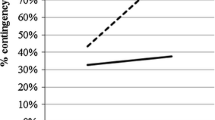Abstract
Coaching for increased teacher efficacy (both instructional and self) has been an essential component to various educational reforms such as No Child Left Behind; Reading First projects and Early Reading First Projects. Those seeking to improve teacher performance leading to enhanced student outcomes on various state assessments have also incorporated coaching into the methodology. The purpose of this study was to look at the linkage between hours spent coaching teachers in the classroom for efficacy in content instruction and child achievements/outcomes. A significant correlation was seen in year one between the time coaches spent in the classroom and students’ alphabet recognition scores. The coaching model for year one was one that focused coaching for instructional efficacy in specific content and teaching methods and saw the coaches directly facilitate and support theory to practice. In year two and three, no significant correlation was found. Year two and three used a coaching model which was less specific in focus and increased time spent on site with teachers. The implications for coaching practice includes balancing time between four components to effective coaching; (1) instructing for specific content, (2) modeling techniques and instructional practices, (3) observing teacher practices and (4) consulting for reflection.
Similar content being viewed by others
References
Armor, D., Conroy-Oseguera, P., Cox, M., King, N., McDonel, L., Pascal, A., Pauly, E., & Zellman, G. (1976). Analysis of school preferred reading programs in selected Los Angeles minority schools. Santa Monica, CA: RAND. (ERIC Document Reproduction Service No. ED 130 243).
Ashton, P., & Webb, R. (1986). Making a difference: Teachers’ sense of efficacy and student achievement. New York: Longman.
Berman, P., McLaughlin, M., Bass, G., Pauly, E., & Zellman, G. (1977). Federal programs supporting educational change; Vol. VII. Factors affecting implementation and continuation. Santa Monica, CA: RAND. (ERIC Document Reproduction Service No. ED 140 432).
Conover, W. (1980). Practical non-parametric statistics (2nd ed.). New York: Wiley.
Day, C. (1993). Reflection: A necessary but not sufficient condition for professional development. British Educational Research Journal, 19(1), 83–93. doi:10.1080/0141192930190107.
Gibson, S., & Dembo, M. (1984). Teacher efficacy: A construct validation. Journal of Educational Psychology, 76(4), 569–582. doi:10.1037/0022-0663.76.4.569.
Guskey, T. (1984). Staff development and the process of teacher change. Educational Research, 15(5), 41–47.
Guskey, T. (1988). Teacher efficacy, self-concept, and attitudes toward the implementation of instructional innovations. Teaching and Teacher Education, 4(1), 63–69. doi:10.1016/0742-051X(88)90025-X.
Knight, J. (2007). Instructional coaching: A partnership approach to improving instruction. Thousand Oaks, CA: Sage.
Midgley, C., Feldlaufer, H., & Eccles, J. (1989). Change in teacher efficacy and student self and task related beliefs in mathematics during a transition to junior high school. Journal of Educational Psychology, 81, 247–258. doi:10.1037/0022-0663.81.2.247.
Resnick, L. (1987). Learning in school and out. Educational Research, 16(9), 13–20.
Ross, J. (1992). Teacher efficacy and the effects of coaching on student achievement. Canadian Journal of Education, 17(1), 51–65. doi:10.2307/1495395.
Stein, M., & Wang, M. (1988). Teacher development and school improvement: The process of teacher change. Teaching and Teacher Education, 4, 171–187. doi:10.1016/0742-051X(88)90016-9.
Steinberg, W. (2008). Statistics alive. Thousand Oaks, CA: Sage.
Strickland, D., & Riley-Ayers, S. (2007). Literacy leadership in early childhood education: The essential guide. New York: Teachers College Press.
Toll, C. (2006). The literacy coach’s desk reference. Urbana, IL: National Council of Teachers of English.
Tschannen-Morean, M., Woolfolk-Hoy, A., & Hoy, W. (1998). Teacher efficacy: Its meaning and measure. Review of Educational Research, 68(2), 202–248.
Vartuli, S. (2005). Beliefs: The heart of teaching. Young Children, 60(5), 76–86.
Author information
Authors and Affiliations
Corresponding author
Rights and permissions
About this article
Cite this article
Shidler, L. The Impact of Time Spent Coaching for Teacher Efficacy on Student Achievement. Early Childhood Educ J 36, 453–460 (2009). https://doi.org/10.1007/s10643-008-0298-4
Received:
Accepted:
Published:
Issue Date:
DOI: https://doi.org/10.1007/s10643-008-0298-4




